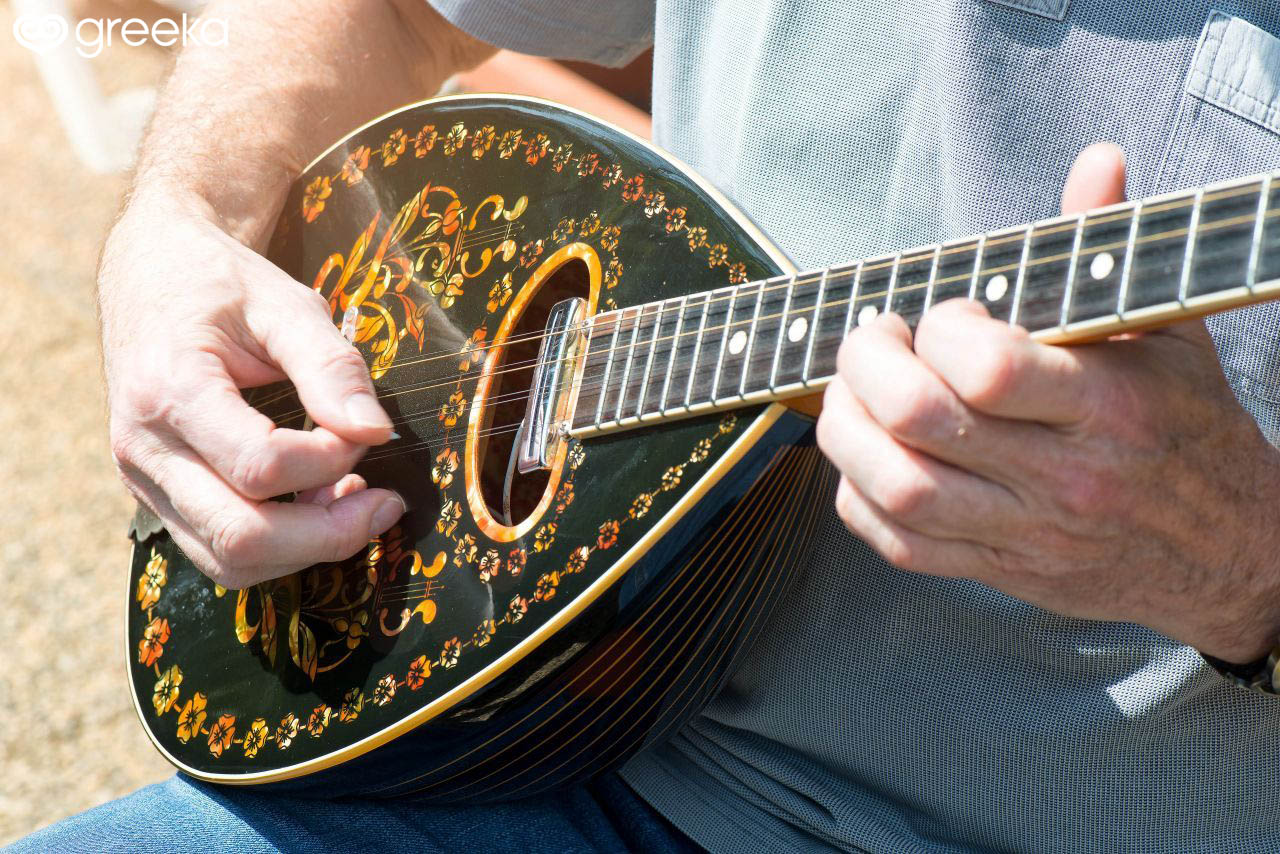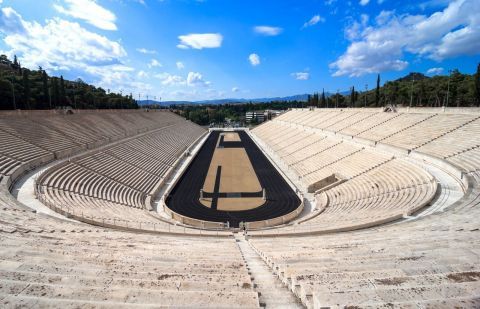Greece Music

Music in Greece is of unbelievable diversity due to the creative Greek assimilation of different influences of the Eastern and Western cultures of Asia and Europe. Music is an important aspect of the daily culture of the country It has a long history dating from Antiquity, during which poetry, dancing, and music were inseparable and played an important part in ancient Greek's everyday life. The Greek tragedy used music as one of its component elements.
Then, with the fall of Ancient Greece and the evolution of the Byzantine Empire, Greece music got a more ecclesiastical approach. In the 400 years of Ottoman domination, it was influenced by eastern sounds. It got reborn only in the 19th century with the opera compositions of Nikolaos Mantzaros (1795-1872) and Spyros Samaras (1861-1917).
From that moment on, Greece produced many talented artists, including great composers to fabulous interprets. Music in Greece became an expression and a testimony of the slavery years, a weapon of opposition against the colonel's authority and a way to express love, death, human fears, that accompanied the Greeks in their everyday life.
Read also: After reading about the music, get also informed about the traditions.
Music types and famous Greek artists
Information about Greece Music types (Dimotiko, Kantada, Nisiotika, Rebetiko) and information about some of the world-famous artists (Kalomiris, Miropoulos, Callas, Xenakis, Theodorakis and more)
1. Music Types
- Folk Songs (Dimotiko Tragoudi)
Greek folk song sees its origins coming from the time of ancient Greek poetry and music. It can be divided into two musical movements: the akritic and the klephtic. The akritic style dates from the 9th century AD and it was created to express the life and struggles of the frontier guards of the Byzantine Empire, the "akrites".
The klephtic style was born between the end of the Byzantine period and the beginning of the Greek Revolution that led to the Greek Independence in 1821. This style was created by the "kleftes", the heroes who left to live in the mountains, leading a revolutionary action against the Ottoman tyranny. The klephtic musical style is monophonic, with second voices repeating a given rhythmical formula, without any harmonic accompaniment. It is composed of love songs, wedding songs, songs of exile, songs of freedom, death, and sorrows. It expresses an important, bloody part of the history and the life of the Greeks.
Musical instruments used in Greek folk songs are the lira and laouto (lute), the tambouras and gaida (bagpipe), the zournas (shawm), the daouli (drum), the dachares (tambourine), the ziyia (paired groups) and the violi (violin).
- Kantada
Originated from Kefalonia island and created at the beginning of the 19th century, it is a style of romantic serenade music, sung with three male voices in chorus, accompanied by guitar or mandolin. This style had been influenced by Italian music and soon gained all the Ionian Islands and the rest of Greece. In Athens, the cantadha is a little different, accompanied by a compania composed of a violin, clarinet, and laouto.
- Nisiotika
This kind of popular songs was born in the Greek islands. Every island has its own nissiotiko style and its own way of dancing it. Violin, lira, clarinet, and guitar accompany the high-pitched women voices or the low voice of a single man. Nissiotika are still easy to listen in every festival on any Greek island, during which a huge group of musicians plays live music during the whole night.
- Rebetiko
This particular and famous style of music in Greece was born in the hashish dens and the tekedes, the Turkish style underground cafes of the district of Piraeus and the city of Thessaloniki. Rembetiko music was spread by the two million Greek refugees coming from Asia Minor in 1922, after the destruction of Smyrna by the Turks. Homesick and rejected by the Greek population, those Greeks who had never lived in Greece and who had lost everything, sang about their surroundings, poverty, pain, hunger, prison, police oppression, drug addiction, betrayal, and hashish. Rembetiko was the forbidden music of the outcast, the Greek urban blues.
The rebetiko slowly in the 1950s came out of the underground world and started to be played in the nightclubs of Athens, where it became very popular, even if it was despised by the Greek people because they saw it as outcast music. The principal instruments of the rembetiko are the bouzouki, an eight-string oval-shape instrument, the baglama, which looks like a miniature bouzouki, and the guitar as well as, for accompaniment, the ziyia, and the ntefi, a leather small tambourine with little metallic plates circling it.
Some of the greatest and most famous players and singers are Vassilis Tsitsanis, Markos Vamvakaris, Marika Ninou, and Sotiria Bellou. During the 1960s, the rembetiko became unpopular again. Young people preferred the new rock music coming from the West and the oldest one started listening again to the candhades of the 1920s. But these music styles are back in the trends and many taverns propose rebetika music bands during weekends.
Read more: Rebetiko & Feasts in Greece
- Late 20th-century music
In the 1980s, modern artists like Dionyssis Savopoulos, Georgios Ntalaras, Nikos Papazoglou, Stavros Xarhakos, and Pavlos Sidiropoulos rehabilitated the rembetiko music and mixed it with rock music, bringing to life a new, passionate and interesting kind of music. Their lyrics were about personal or political freedom (Savopoulos, Ntallaras, and Sidiropoulos), or about aspects of everyday life, pain and sorrow (Papazoglou), and drugged generation (Sidiropoulos).
2. World-famous Greek music artists
- Manolis Kalomiris (1883-1962)
He is one of the most famous Greek classical composers and representative of the Greek National School. He used, for inspiration, Greek folk tradition and works of great Greek poets like Palamas, Mavilis, Sikelianos, and others. He founded the Greek Conservatorium and the National Conservatorium of Greece.
- Dimitris Mitropoulos (1896-1960)
The most important contemporary Greek composer, maestro, and pianist often identified as being the new Mahler.
- Maria Callas (1923-1977)
Born in New York from Greek parents, Callas was the most celebrated soprano in opera. She was particularly famous for her unique presence on stage and for her turbulent relationship with Aristotelis Onasis.
- Yannis Xenakis (1922-2001)
Because he was condemned to death by the Germans for participating in the Resistance, Xenakis was forced to leave Greece and go to Paris. The originality of his music led him to become a composer with international recognition. His musical work consists of acoustic, electro-acoustic and multimedia creations. He was a pioneer of the development of digital synthesis.
- Mikis Theodorakis (1925-)
He is the most famous Greek composer who wrote songs against the German occupation and was an active member of the largest Greek resistance organization (EAM). He was very active during the Civil War and the years of the Greek Junta. In 1954, he went to Paris where he wrote ballet and music for films. Since he was writing about freedom and equality, he became an international symbol of Greece.
- Manos Hatzidakis (1925-1994)
He is one of the most important Greek composers, who wrote music for many ancient tragedies as well as things for the modern repertory, light and folk songs which provoked a revival of the folk music. He also created music for theatre, ballet, and cinema.





